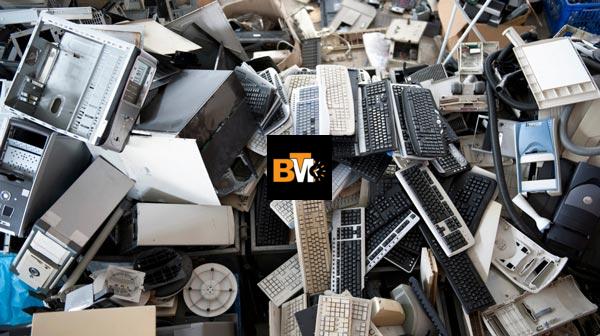Each time a smartphone upgrade cycle completes or a computer reaches the end of its life, millions of consumers are left wondering what to do with last year’s model. In 2024 alone, the world generated an estimated 62 million metric tons of electronic waste—e-waste—according to the United Nations Global E-waste Monitor. That figure makes e-waste the fastest-growing solid-waste stream on the planet. Yet only about 20 percent is formally collected and recycled. The rest is landfilled, incinerated, or shipped to informal dumps where it leaches toxins into soil and water. Understanding why responsible electronics recycling matters is essential for consumers, businesses, and policymakers alike.
The Mounting E-Waste Challenge
Consumer demand for connected devices shows no sign of slowing. Rapid product refresh cycles, low-cost manufacturing, and the proliferation of Internet-of-Things (IoT) gadgets mean that electronic products become obsolete faster than ever. When discarded improperly, a single device can introduce dozens of hazardous substances into the environment—lead, mercury, cadmium, brominated flame retardants, and lithium among them. Over time, these pollutants concentrate in ecosystems, putting wildlife and human health at risk.
Meanwhile, global supply chains are straining to secure the critical minerals—lithium, cobalt, nickel, rare earths—needed to build the next generation of batteries, circuit boards, and displays. Ironically, many of those same materials sit in landfills, locked inside yesterday’s electronics. Recycling recovers them far more efficiently than mining virgin ore, reducing both resource depletion and geopolitical pressure on mineral-rich regions.
Health and Social Impacts
In the developing world, informal e-waste dumps often employ untrained laborers—sometimes children—who dismantle devices by hand or burn wiring in open pits to recover copper. These practices expose workers to lead dust, acid fumes, and toxic smoke, elevating risks of respiratory disease, neurological damage, and reproductive disorders. Communities situated near such sites experience soil infertility and contaminated crops.
Formal recycling eliminates these hazards by adhering to rigorous safety protocols, enclosed processing lines, and air-filtration systems. Beyond protecting workers, responsible recycling alleviates the public-health burden on entire regions and aligns with global efforts to achieve the United Nations Sustainable Development Goals on good health, clean water, and responsible consumption.
Economic Advantages and Circular-Economy Momentum
Electronics recycling is not just an environmental imperative—it is a significant economic opportunity. The U.N. estimates the intrinsic raw-material value of untreated e-waste exceeds $90 billion annually, encompassing gold, silver, palladium, aluminum, steel, and high-grade plastics. Capturing even a fraction of that value stimulates domestic manufacturing, creates green-collar jobs, and improves supply-chain resilience.
A robust e-waste recycling sector also accelerates progress toward a circular economy, where products, components, and materials remain in use for as long as possible. Companies that design devices for disassembly and partner with certified recyclers lower their material costs while satisfying growing stakeholder demands for sustainability. In addition, investors are increasingly evaluating firms on environmental, social, and governance (ESG) metrics, where effective end-of-life management earns higher scores and attracts capital.
Corporate Responsibility and Brand Reputation
Data breaches and intellectual-property leaks frequently originate from discarded devices, not cyber intrusions. Hard drives, solid-state drives, and embedded memory can retain sensitive information unless they are properly sanitized or physically destroyed within a secure recycling workflow. By choosing reputable recyclers, organizations safeguard confidential data, comply with privacy regulations, and avoid costly penalties.
Further, consumers reward brands that demonstrate environmental stewardship. Public commitments to recycle returned devices and publish transparent take-back metrics enhance brand loyalty. Conversely, negative headlines about equipment found in overseas dumpsites can undermine years of marketing investment. Implementing clear e-waste policies and partnering with responsible recyclers is therefore both an ethical duty and a strategic brand-protection measure.
Practical Steps for Responsible Electronics Recycling
While national regulations differ, most municipalities now offer drop-off locations or periodic collection events for household e-waste. Many electronics retailers run free take-back programs for small gadgets, and manufacturers often provide mail-back kits. For businesses with large device inventories, licensed asset-recovery partners can supply secure containers, logistics, data destruction, and detailed audit trails—ensuring compliance and peace of mind.
Before retiring any device, back up important files, sign out of cloud accounts, and reset the operating system to factory settings. For added security, use software-based wiping utilities or degaussing equipment to render data irretrievable. Batteries should be removed and recycled separately, as they require specialized handling to prevent fire risk.
Conclusion
The importance of recycling electronics extends far beyond clearing cluttered drawers. It directly addresses some of the most pressing environmental challenges of our time—climate change, resource scarcity, toxic pollution—and fosters social justice by eliminating hazardous informal labor. It also unlocks economic value, strengthens supply chains, and protects sensitive data in an increasingly digital world.
By choosing to recycle your electronics through responsible channels, you play a vital role in closing the loop on materials, safeguarding public health, and driving the circular economy forward. The next time you upgrade a phone or retire a laptop, remember that what seems like obsolete junk is in fact a treasure trove of resources waiting for a second life—and that simple decision to recycle is one of the most impactful sustainability actions you can make today.







Leave a Reply